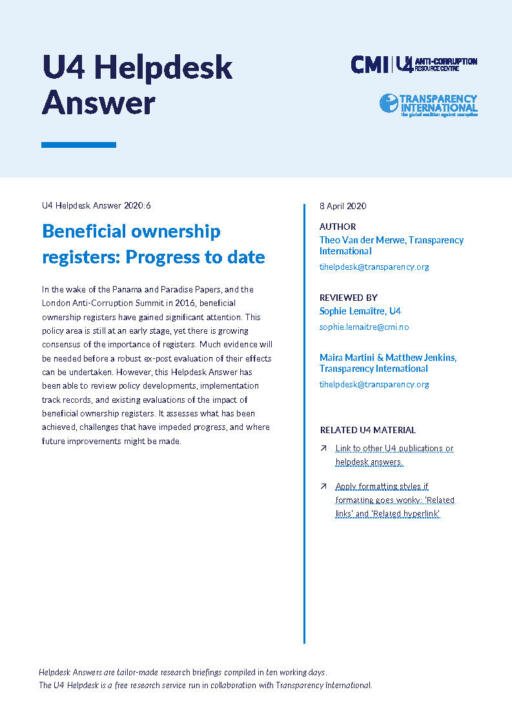
This Anti-Corruption Helpdesk brief was produced in response to a query from a U4 Partner Agency. The U4 Helpdesk is operated by Transparency International in collaboration with the U4 Anti-Corruption Resource Centre based at the Chr. Michelsen Institute.
Query
We would like to have a better understanding of beneficial ownership registers. Please provide an overview of the evidence on i) the effectiveness of policy efforts to date, ii) the effectiveness of the implementation of registers and iii) the effect of registers in terms of deterrence, assisting in prosecutions and so on.
Contents
- Introduction
- Effectiveness of policy efforts to date
- Implementation effectiveness
- Effect of registers
- References
Main points
- Important progress has been made in promoting the establishment of public, centralised registers of beneficial ownership since 2016. The foremost example of this to date is the Fifth EU Directive on Anti-Money Laundering and Counter-terrorist Financing.
- However, implementation remains uneven. Uptake has generally lagged behind national and international policy commitments. Few fully public registers exist, with the majority concentrated in the EU.
- Emerging evidence shows that registers have important roles to play in assisting in the detection and prosecution of money laundering cases by enforcement agencies. On the supply side of financial crime, this likely serves as a powerful deterrent. They also seem to have important private sector advantages, assisting in due diligence efforts and increasing competition.
- In addition to ensuring implementation, further progress is needed in embedding verification elements into the design of registers and ensuring that regulatory arbitrage is avoided.
Summary
In the wake of the Panama and Paradise Papers, and the London Anti-Corruption Summit in 2016, beneficial ownership registers have gained significant attention. This policy area is still at an early stage, yet there is growing consensus of the importance of registers. Much evidence will be needed before a robust ex-post evaluation of their effects can be undertaken. However, this Helpdesk Answer has been able to review policy developments, implementation track records, and existing evaluations of the impact of beneficial ownership registers. It assesses what has been achieved, challenges that have impeded progress, and where future improvements might be made.
Authors
Theo Van der Merwe, Transparency International, [email protected]
Reviewers
Sophie Lemaître, U4, [email protected]
Maira Martini and Matthew Jenkins, Transparency International, [email protected]
Date
11/06/2020
Tags
 Download PDF
Download PDF
